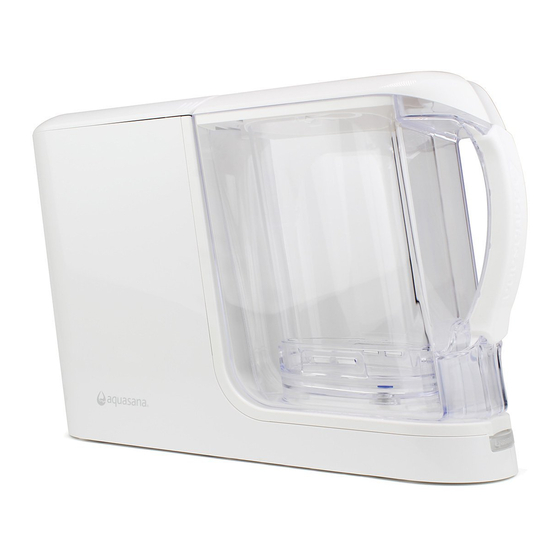Aquasana AQCWM-P-B Instruções de configuração - Página 11
Procurar online ou descarregar pdf Instruções de configuração para Sistemas de filtragem de água Aquasana AQCWM-P-B. Aquasana AQCWM-P-B 12 páginas. The clean water machine
Também para Aquasana AQCWM-P-B: Instruções de configuração (7 páginas)

Performance Data Sheet for the Aquasana Clean Water Machine
Models
AQ-CWM-RB1, AQ-CWM-RB2, AQ-CWM-RB1W, AQ-CWM-P-W, AQ-
CWM-P-B, AQ-CWM-D-W, AQ-CWM-D-B, AQ-PCBK-GC, AQ-PC-GC
Manufactured by: Aquasana, Inc. 6310 Midway Road · Haltom City, Texas 76117 · 866.662.6885
Testing Performed under NSF/ANSI Standards 42 and 53 and in accordance with the California Department of Health Services Drinking Water
Treatment Device Program. This system has been tested according to NSF/ANSI 42, 53, 401 & P473 for reduction of the substances listed
below. The concentration of the indicated substances in water entering the system was reduced to a concentration less than or equal to the
permissible limit for water leaving the system, as specified in NSF/ANSI 42, 53, 401 & P473.
System tested and certified by NSF International against
NSF/ANSI Standard 42, 53 & 401 and conforms to
NSF protocol P473 for reduction of claims specified on
thePerformance Data Sheet and at www.nsf.org.
• All contaminants reduced by this filter are listed.
• Not all contaminants listed may be present in your water.
• Does not remove all contaminants that may be present in
tap water.
Filter is only to be used
with cold water.
Filter usage must comply
with all state and local laws.
Testing was performed under standard laboratory
conditions, actual performance may vary.
Systems certified for cyst reduction may be used on
disinfected waters that may contain filterable cysts.
See owner's manual for general installation conditions
and needs plus manufacturer's limited warranty.
Do not use with water that is microbiologically
unsafe or of unknown water quality without
adequate disinfection before or after the system.
Operating
Replacement
Rated capacity
pressure range
AQ-CWM-R-D,
320 gallons
20-70 psi
AQ-CWM-R-R
1200 liters
137-482 kPa
NSF/ANSI 42
Chlorine Reduction, Free Available
Chloramine Reduction, Free Available
Particulate Reduction
NSF/ANSI 53
Asbestos Reduction
Cyst Live Cryptosporidium & Giardia
Lead Reduction pH 6.5
Lead Reduction pH 8.5
Mercury Reduction pH 8.5
Mercury Reduction pH 6.5
MTBE Reduction
Turbidity
VOC Surrogate Test
Maximum
NSF/ANSI 401
Concentration
Atenolol
30 ng/L
Bisphenol A
300 ng/L
Carbamazepine
200 ng/L
DEET
200 ng/L
Estrone
20 ng/L
Ibuprofen
60 ng/L
Linuron
20 ng/L
Meprobamate
60 ng/L
Metolachlor
200 ng/L
Naproxen
20 ng/L
Nonyl phenol
200 ng/L
Phenytoin
30 ng/L
TCEP
700 ng/L
TCPP
700 ng/L
Trimethoprim
20 ng/L
Influent
NSF P473
challenge
concentration
Perfluorooctanoic acid (PFOA) &
1.5 ±10% ug/L
Perfluorooctane sulfonate (PFOS)
Organic chemicals included by surrogate testing
Operating
Rated
temp. range
flow
VOCs (by surrogate testing
using chloroform)
40-90° F
0.5 gpm
4.44-32.2° C
1.8 lpm
alachlor
atrazine
benzene
carbofuran
carbon tetrachloride
chlorobenzene
chloropicrin
2,4-D
dibromochloropropane (DBCP)
o-dichlorobenzene
Minimum
Overall %
Reduction Results
p-dichlorobenzene
Reduction
1,2-dichloroethane
<0.5 mg/l
96.06%
Pass
1,1-dichloroethylene
<0.5 mg/l
96.06%
Pass
cis-1,2-dichloroethylene
85%
99.9%
Pass
trans-1,2-dichloroethylene
1,2-dichloropropane
Minimum
Overall %
Reduction Results
cis-1,3-dichloropropylene
Reduction
dinoseb
99%
>99%
Pass
endrin
99.95%
>99.95%
Pass
ethylbenzene
<10 ug/L
>99.3%
Pass
ethylene dibromide (EDB)
<10 ug/L
>99.4%
Pass
haloacetonitriles (HAN)
bromochloroacetontrile
<2 ug/L
>96.7%
Pass
dibromoacetontrile
<2 ug/L
>96.6%
Pass
dichloroacetontrile
<5 ug/L
91.2%
Pass
trichloroacetontrile
<0.5 NTU
99.1%
Pass
haloketones (HK)
95%
95%
Pass
1,1-dichloro-2-propanone
1,1,1-trichloro-2-propanone
Minimum
Overall %
heptachlor (H-34, Heptox)
Reduction Results
Reduction
heptachlor epoxide
hexachlorobutadiene
94.2%
94.2%
Pass
hexachlorocyclopentadiene
98.80%
98.9%
Pass
lindane
98.6%
98.6%
Pass
methoxychlor
98.7%
98.7%
Pass
pentachlorophenol
96.30%
96.5%
Pass
simazine
95.3%
95.4%
Pass
styrene
96.6%
96.6%
Pass
1,1,2,2-tetrachloroethane
tetrachloroethylene
94.7%
94.7%
Pass
toluene
98.6%
98.6%
Pass
2,4,5-TP (silvex)
96.3%
96.4%
Pass
tribromoacetic acid
97.50%
97.5%
Pass
1,2,4-trichlorobenzene
95.50%
95.6%
Pass
1,1,1-trichloroethane
98%
98%
Pass
1,1,2-trichloroethane
97.8%
97.8%
Pass
trichloroethylene
trihalomethanes (THMs)
96.7%
96.7%
Pass
Maximum
bromodichloromethane (THM)
permissible
Overall %
bromoform (THM)
concentration
reduction Results
chloroform (THM)
chlorodibromomethane (THM)
0.07 ug/L
95.8%
Pass
xylenes (total)
Drinking water regulatory level
Influent/
Effluent/
(MCL/MAC) mg/L
Unfiltered
Filtered
0.002
0.050
0.001
0.003
0.100
0.003
0.005
0.081
0.001
0.04
0.190
0.001
0.005
0.078
0.0018
0.1
0.077
0.001
—
0.015
0.0002
0.07
0.110
0.0017
0.0002
0.052
0.00002
0.6
0.080
0.001
0.075
0.040
0.001
0.005
0.088
0.0048
0.007
0.083
0.001
0.07
0.170
0.0005
0.1
0.086
0.001
0.005
0.080
0.001
—
0.079
0.001
0.007
0.170
0.0002
0.002
0.053
0.00059
0.7
0.088
0.001
0.00005
0.044
0.00002
—
0.022
0.0005
—
0.024
0.0006
—
0.0096
0.0002
—
0.015
0.0003
—
0.0072
0.0001
—
0.0082
0.0003
0.0004
0.025
0.00001
0.0002
0.0107
0.0002
—
0.044
0.001
0.05
0.060
0.000002
0.0002
0.055
0.00001
0.04
0.050
0.0001
0.001
0.096
0.001
0.004
0.120
0.004
0.1
0.150
0.0005
—
0.081
0.001
0.005
0.081
0.001
1
0.078
0.001
0.05
0.270
0.0016
—
0.042
0.001
0.07
0.160
0.0005
0.2
0.084
0.0046
0.005
0.150
0.0005
0.005
0.180
0.0010
Influent/
Effluent/
Unfiltered
Filtered
0.080
0.300
0.015
10
0.070
0.001
Percent
Reduction
>98%
>97%
>99%
>99%
98%
>99%
99%
98%
>99%
>99%
>98%
95%
>99%
>99%
>99%
>99%
>99%
99%
99%
>99%
>99%
98%
98%
98%
98%
99%
96%
>99%
98%
>98%
>99%
>99%
>99%
>99%
>97%
>99%
>99%
>99%
>99%
99%
>98%
>99%
95%
>99%
>99%
Percent
Reduction
95%
>99%
